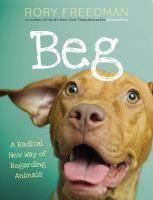
Beg: a Radical New Way of Regarding Animals, with its sweet-faced dog peering at me from a soft, sage green background, imploring me to “regard him in a new way” didn’t prepare me for the most heavy-handed, condescending book I’ve ever experienced. Freedman doesn’t actually present “a radical new way of regarding animals” so much as beat readers over the head with how perfectly enlightened she’s become and then shame us into submitting to her will.
After about page 50, I had a hard time imagining who Freedman’s target audience could possibly be. Readers already involved in rescue won’t learn anything new. They’re undoubtedly familiar with Freedman’s sources. The truly uninformed can be nothing but overwhelmed and put off by her superior tone throughout. “Foregoing what you want for the greater good builds self-esteem. And it builds a rarely used spiritual muscle, too.” Freedman seems to be saying that she and she alone has been sacrificing and if we can just follow in her footsteps, we too can be as spiritually robust as she. Her attitude is very much one of shaming readers into following a cult-like program for which she alone is suitable for leadership.
While Freedman cites many of her sources and has done considerable research, she also makes gross generalizations. For example, in her list of “don’ts” she says, “Most dogs do not like going to the groomer…” Really? How many dogs has she asked? How many dogs has she herself groomed? And regardless, it doesn’t matter. The groomer is necessary for many dogs, making her statement silly. I hate going to the salon; I do it because I always feel better afterward. I hate the gym; I always feel better afterward. If my Lhasa Apso hates getting groomed, I guarantee he hates being matted, itchy and dirty more.
The biggest disappointment, however, is that the brilliantly compelling cover of Beg has been wasted on Freedman’s book.
I get what she’s trying to do. Unfortunately, her efforts have fallen flat for me. For truly moving and instructive stories that speak for themselves check out Ninety-five: Meeting America’s Farmed Animals in Stories and Photographs, or the documentary Fresh, which introduces farmers who are re-inventing our food system. Both make the same case as Freedman without the browbeating.
